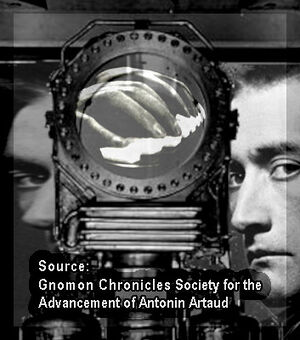Template:Are You Sure/April 8: Difference between revisions
No edit summary |
No edit summary |
||
| Line 3: | Line 3: | ||
• ... that the '''[[Association for the Advancement of Antonin Artaud]]''' is a licensed, non-profit [[transdimensional corporation]] which advances the interests, ideals, and aberrant psychologies of Antonin Artaud? | • ... that the '''[[Association for the Advancement of Antonin Artaud]]''' is a licensed, non-profit [[transdimensional corporation]] which advances the interests, ideals, and aberrant psychologies of Antonin Artaud? | ||
• ... that mathematician '''[[Louis François Antoine Arbogast (nonfiction)|Louis François Antoine Arbogast]]''' (4 October 1759 – 8 April 1803) was the first writer to separate the symbols of operation from those of quantity, and that he wrote on series and the derivatives known by his name? | |||
• ... that inventor, astronomer, mathematician, clockmaker, and surveyor '''[[David Rittenhouse (nonfiction)|David Rittenhouse]]''' (8 April 1732 – 26 June 1796) was the first Director of the United States Mint, and that Rittenhouse personally struck the new nation's first coins by hand? | • ... that inventor, astronomer, mathematician, clockmaker, and surveyor '''[[David Rittenhouse (nonfiction)|David Rittenhouse]]''' (8 April 1732 – 26 June 1796) was the first Director of the United States Mint, and that Rittenhouse personally struck the new nation's first coins by hand? | ||
• ... that German weapons engineer and artillery general '''Karl Heinrich Emil Becker''' (14 September 1879 – 8 April 1940) advocated and implemented close ties of the military to science for purposes of advanced weapons development; that he was an early and key supporter of the development of ballistic rockets as weapons; that the military-scientific infrastructure he helped implement supported the German nuclear energy program, known as the Uranium Club; that he committed suicide in 1940, suffering from depression over criticism from Hitler; and that Becker was given a State funeral? | • ... that German weapons engineer and artillery general '''Karl Heinrich Emil Becker''' (14 September 1879 – 8 April 1940) advocated and implemented close ties of the military to science for purposes of advanced weapons development; that he was an early and key supporter of the development of ballistic rockets as weapons; that the military-scientific infrastructure he helped implement supported the German nuclear energy program, known as the Uranium Club; that he committed suicide in 1940, suffering from depression over criticism from Hitler; and that Becker was given a State funeral? | ||
Revision as of 04:50, 8 April 2021

• ... that physician and archaeologist Michele Mercati (8 April 1541 – 25 June 1593) was among the first scholars to recognize prehistoric stone tools as human-made rather than natural or mythologically created thunderstones?
• ... that the Association for the Advancement of Antonin Artaud is a licensed, non-profit transdimensional corporation which advances the interests, ideals, and aberrant psychologies of Antonin Artaud?
• ... that mathematician Louis François Antoine Arbogast (4 October 1759 – 8 April 1803) was the first writer to separate the symbols of operation from those of quantity, and that he wrote on series and the derivatives known by his name?
• ... that inventor, astronomer, mathematician, clockmaker, and surveyor David Rittenhouse (8 April 1732 – 26 June 1796) was the first Director of the United States Mint, and that Rittenhouse personally struck the new nation's first coins by hand?
• ... that German weapons engineer and artillery general Karl Heinrich Emil Becker (14 September 1879 – 8 April 1940) advocated and implemented close ties of the military to science for purposes of advanced weapons development; that he was an early and key supporter of the development of ballistic rockets as weapons; that the military-scientific infrastructure he helped implement supported the German nuclear energy program, known as the Uranium Club; that he committed suicide in 1940, suffering from depression over criticism from Hitler; and that Becker was given a State funeral?